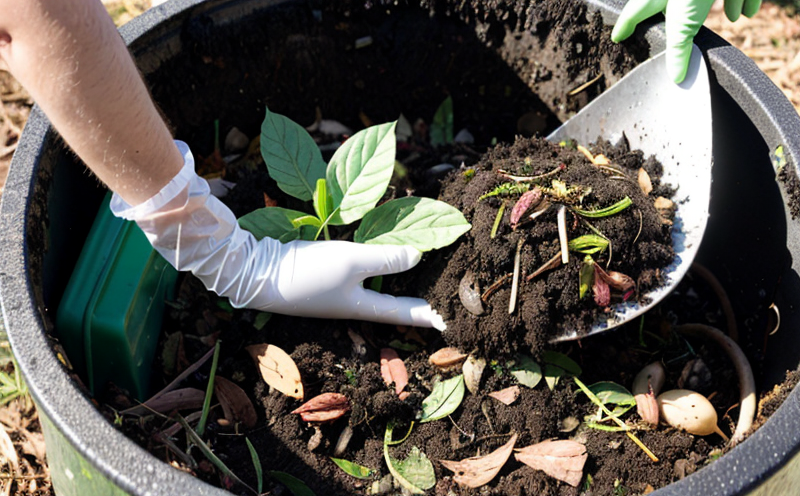EN 15587 Microbial Stability Testing in Waste-Derived Compost
The European Standard EN 15587 provides a stringent framework for assessing microbial stability in waste-derived compost. This standard is critical for ensuring the safe and effective use of compost materials, particularly in agricultural applications where microbial activity can influence soil health and crop productivity.
Composting involves the biological decomposition of organic matter into stable humus, which enhances soil structure and fertility. However, this process also leads to significant changes in microbial communities within the compost. The EN 15587 test assesses whether these changes are reversible over time, ensuring that the final product is safe for use.
The standard specifies conditions under which compost samples should be incubated at controlled temperatures and humidity levels to simulate real-world scenarios. This testing protocol evaluates whether microorganisms within the compost can recover their initial state after a defined period of microbial activity. Compliance with this test ensures adherence to stringent quality control measures, thereby enhancing consumer trust in waste-derived compost products.
Achieving EN 15587 certification is essential for manufacturers and suppliers of compost materials aiming to meet regulatory requirements and ensure product safety. By adhering to these standards, businesses can demonstrate their commitment to environmental sustainability and public health, fostering long-term relationships with customers who prioritize eco-friendly practices.
The testing process involves multiple steps, including sample collection, preparation, inoculation, incubation, and analysis. Each step is meticulously designed to mimic the natural composting cycle while providing controlled conditions for observation. This comprehensive approach ensures accurate evaluation of microbial stability, enabling manufacturers to optimize production processes and improve product quality.
Compliance with EN 15587 can significantly benefit businesses by enhancing their reputation in the market. Consumers increasingly seek products that align with environmental values, and meeting such standards signals a strong commitment to these principles. Moreover, successful certification opens doors to international markets where stringent regulations govern waste management practices.
In conclusion, the EN 15587 Microbial Stability Testing is an indispensable tool for ensuring the safety and efficacy of waste-derived compost materials. By adhering to this standard, manufacturers can enhance product quality, meet regulatory requirements, and build a robust reputation in the market.
Scope and Methodology
The scope of EN 15587 focuses on assessing the microbial stability of waste-derived compost under controlled conditions. This testing is particularly relevant for materials intended for agricultural use, where microbial activity can significantly impact soil health and crop productivity.
- Sample Preparation: Samples are collected from different stages of the composting process to reflect various levels of microbial maturity.
- Inoculation: Selected microorganisms are introduced into the samples to simulate real-world conditions.
- Incubation: Samples are incubated at controlled temperatures and humidity levels for a specified period, typically 28 days.
- Analysis: Microbial activity is assessed using various analytical techniques, including quantitative PCR (qPCR) and culture-based methods.
The methodology ensures that the test accurately reflects the natural composting cycle while providing controlled conditions for observation. This comprehensive approach enables accurate evaluation of microbial stability, allowing manufacturers to optimize production processes and improve product quality.
Compliance with EN 15587 is essential for ensuring the safety and efficacy of waste-derived compost materials. By adhering to these standards, businesses can enhance their reputation in the market and meet regulatory requirements.
Why Choose This Test
- Regulatory Compliance: Ensures adherence to European standards for waste management and compost quality.
- Enhanced Product Quality: Provides confidence in the microbial stability of your compost materials, ensuring consistent performance.
- Improved Customer Trust: Demonstrates a strong commitment to environmental sustainability and public health.
- International Market Access: Opens doors to international markets where stringent regulations govern waste management practices.
- Optimized Production Processes: Helps manufacturers identify areas for improvement, leading to more efficient production methods.
- Accurate Evaluation: Provides reliable data on microbial stability, enabling informed decision-making throughout the product lifecycle.
The EN 15587 Microbial Stability Testing is a critical tool for ensuring the safety and efficacy of waste-derived compost materials. By adhering to this standard, businesses can enhance their reputation in the market and meet regulatory requirements.
Competitive Advantage and Market Impact
The EN 15587 Microbial Stability Testing is more than just a compliance requirement; it offers significant competitive advantages. By ensuring that your compost materials are safe for agricultural use, you can differentiate yourself from competitors who may not meet the same stringent standards.
Meeting this standard signals to customers and regulators alike that you prioritize environmental sustainability and public health. This commitment enhances customer trust and loyalty, fostering long-term relationships based on shared values. In an increasingly environmentally conscious market, such actions are crucial for maintaining a positive brand image.
In addition to regulatory compliance, the test provides reliable data on microbial stability, enabling informed decision-making throughout the product lifecycle. This information can be used to optimize production processes and improve overall product quality. By staying ahead of industry trends and meeting evolving standards, you position yourself as a leader in sustainable waste management practices.
The testing process not only ensures that your compost materials meet regulatory requirements but also provides valuable insights into their performance under controlled conditions. This data can inform ongoing research and development efforts, ensuring continuous improvement and innovation within your organization.
By adhering to EN 15587, you demonstrate a strong commitment to environmental sustainability and public health. This commitment enhances customer trust and loyalty, fostering long-term relationships based on shared values. In an increasingly environmentally conscious market, such actions are crucial for maintaining a positive brand image.





